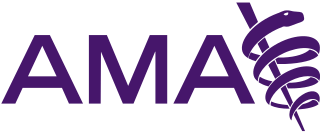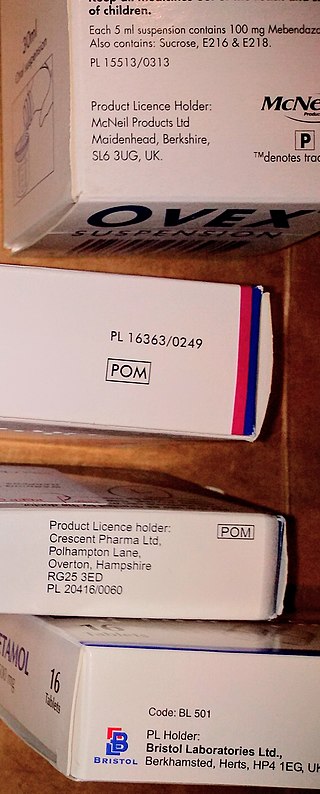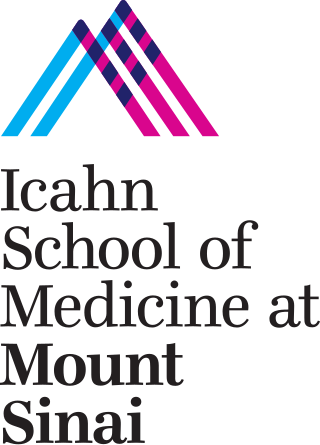
Woonsocket, is a city in Providence County, Rhode Island, United States. The population was 43,240 at the 2020 census, making it the sixth largest city in the state. Being Rhode Island's northernmost city, Woonsocket lies directly south of the Massachusetts state line and constitutes part of both the Providence metropolitan area and the larger Greater Boston Combined Statistical Area.
Resource-based relative value scale (RBRVS) is a schema used to determine how much money medical providers should be paid. It is partially used by Medicare in the United States and by nearly all health maintenance organizations (HMOs).

The American Medical Association (AMA) is an American professional association and lobbying group of physicians and medical students. Founded in 1847, it is headquartered in Chicago, Illinois. Membership was 271,660 in 2022.

The healthcare industry is an aggregation and integration of sectors within the economic system that provides goods and services to treat patients with curative, preventive, rehabilitative, and palliative care. It encompasses the creation and commercialization of products and services conducive to the preservation and restoration of well-being. The contemporary healthcare sector comprises three fundamental facets, namely services, products, and finance. It can be further subdivided into numerous sectors and categories and relies on interdisciplinary teams of highly skilled professionals and paraprofessionals to address the healthcare requirements of both individuals and communities.

A prescription drug is a pharmaceutical drug that is permitted to be dispensed only to those with a medical prescription. In contrast, over-the-counter drugs can be obtained without a prescription. The reason for this difference in substance control is the potential scope of misuse, from drug abuse to practicing medicine without a license and without sufficient education. Different jurisdictions have different definitions of what constitutes a prescription drug.
The Current Procedural Terminology (CPT) code set is a procedural code set developed by the American Medical Association (AMA). It is maintained by the CPT Editorial Panel. The CPT code set describes medical, surgical, and diagnostic services and is designed to communicate uniform information about medical services and procedures among physicians, coders, patients, accreditation organizations, and payers for administrative, financial, and analytical purposes. New editions are released each October, with CPT 2021 being in use since October 2021. It is available in both a standard edition and a professional edition.
Pharmaceutical sales representatives or Medical sales respresentatives are salespeople employed by pharmaceutical companies to persuade doctors to prescribe their drugs to patients. Drug companies in the United States spend ~$5 billion annually sending representatives to doctors, to provide product information, answer questions on product use, and deliver product samples. These interactions are governed according to limits established by the Code on Interactions with Health Care Professionals, created by the Pharmaceutical Research and Manufacturers of America (PhRMA). This code came into practice in 2002 and has since been updated to help define ethical interactions between health care professionals and the pharmaceutical companies
In the healthcare industry, pay for performance (P4P), also known as "value-based purchasing", is a payment model that offers financial incentives to physicians, hospitals, medical groups, and other healthcare providers for meeting certain performance measures. Clinical outcomes, such as longer survival, are difficult to measure, so pay for performance systems usually evaluate process quality and efficiency, such as measuring blood pressure, lowering blood pressure, or counseling patients to stop smoking. This model also penalizes health care providers for poor outcomes, medical errors, or increased costs. Integrated delivery systems where insurers and providers share in the cost are intended to help align incentives for value-based care.

The Icahn School of Medicine at Mount Sinai, formerly the Mount Sinai School of Medicine, is a private medical school in New York City, New York, United States. The school is the academic teaching arm of the Mount Sinai Health System, which manages eight hospital campuses in the New York metropolitan area, including Mount Sinai Hospital and the New York Eye and Ear Infirmary.
Health care prices in the United States of America describe market and non-market factors that determine pricing, along with possible causes as to why prices are higher than in other countries.
Samuel Osiah Thier was professor of Medicine and Health Care Policy at Harvard University. He earned his medical degree at the State University of New York Upstate Medical University in 1960. He previously served as the president of Brandeis University from 1991–1994 and the president of the Massachusetts General Hospital from 1994-96.
The ethics involved within pharmaceutical sales is built from the organizational ethics, which is a matter of system compliance, accountability and culture. Organizational ethics are used when developing the marketing and sales strategy to both the public and the healthcare profession of the strategy. Organizational ethics are best demonstrated through acts of fairness, compassion, integrity, honor, and responsibility.

Dana Paul Goldman is the dean of the USC Price School of Public Policy, Leonard D. Schaeffer Chair and director of the University of Southern California Leonard D. Schaeffer Center for Health Policy and Economics, and Professor of Public Policy, Pharmacy, and Economics at the Price School and USC School of Pharmacy. He is also an adjunct professor of health services and radiology at UCLA, and a managing director and founding partner, along with Darius Lakdawalla and Tomas J. Philipson, at Precision Heath Economics, a health care consulting firm. Previously held positions include the director of the Bing Center for Health Economics, RAND Royal Center for Health Policy Simulation, and UCLA/RAND Health Services Research Postdoctoral Training Program.
Donald J. Kurth, Jr. was a physician, businessowner, educator, and former mayor of the City of Rancho Cucamonga, California (2006–2011). He was elected President of the Rancho Cucamonga Chamber of Commerce in 1994, Director of the Cucamonga County Water District in 1996, appointed to the Rancho Cucamonga City Council in 2002, and elected mayor of Rancho Cucamonga on November 7, 2006.

Howard Markel is an American physician and medical historian. At the end of 2023, Markel retired from the University of Michigan Medical School, where he served as the George E. Wantz Distinguished Professor of the History of Medicine and Director of the University's Center for the History of Medicine. He was also a professor of psychiatry, health management and policy, history, and pediatrics and communicable diseases. Markel writes extensively on major topics and figures in the history of medicine and public health.
Pharmaceutical fraud is when pharmaceutical companies engage in illegal, fraudulent activities to the detriment of patients and/or insurers. Examples include counterfeit drugs that do not contain the active ingredient, false claims in packaging and marketing, suppression of negative information regarding the efficacy or safety of the drug, and violating pricing regulations.
The Specialty Society Relative Value Scale Update Committee or Relative Value Update Committee is a volunteer group of 31 physicians who have made highly influential recommendations on how to value a physician's work when computing health care prices in the United States' public health insurance program Medicare.
The Physician Payments Sunshine Act is a 2010 United States healthcare law to increase transparency of financial relationships between health care providers and pharmaceutical or medical device manufacturers.

Cannabis in Rhode Island is legal for medical and adult use. Medical use was legalized through legislation approved in 2006, and adult use in 2022.
Lisa Bari is an American health policy strategist and consultant. For a period, she served as the lead of health information technology and interoperability at the federal Centers for Medicare and Medicaid Services Innovation Center (CMS).







